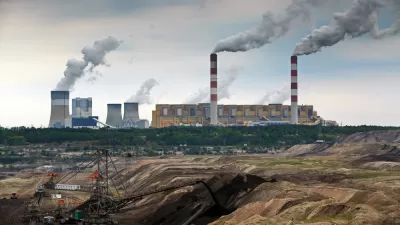This week Lisa Jackson made public her decision to step down as administrator of the EPA. Despite many hard-fought victories, Jackson's tenure is also associated with a lack of significant action to address climate change.
While Juliet Eilperin with The Washington Post outlined "[t]he slew of rules the EPA enacted over the past four years included the first greenhouse-gas standards for vehicles, cuts in mercury and other toxic pollution from power plants and a tighter limit on soot," and the American Planning Association praised her work to "establish an interagency partnership on sustainable communities with HUD and DOT," John M. Broder tied Jackson to the failure of the Obama administration to fulfill the "high hopes of sweeping action to address climate change and other environmental ills."
In addition to fending off attacks from industry and Republicans in Congress, at times it appeared as thought the EPA and the White House were not on the same page, as when President Obama rejected "a proposed new standard for ozone pollution that Ms. Jackson sought in the summer of 2011."
And though Eilperin contends that Jackson "was a hero to the environmental community," Broder notes that "Ms. Jackson’s departure comes as many in the environmental movement are questioning Mr. Obama’s commitment to dealing with climate change and other environmental problems."
"Asked what she considered most important in her tenure, Ms. Jackson mentioned the endangerment finding, because it was the first time that the federal government began to address climate change. She also said that, although it received little notice during her tenure, she was proud of her role in expanding the environmental agenda to include voices that have been little heard, including low-income communities, native Alaskans and American Indian tribes."
FULL STORY: E.P.A. Chief to Step Down, With Climate Still Low Priority

Planetizen Federal Action Tracker
A weekly monitor of how Trump’s orders and actions are impacting planners and planning in America.

Restaurant Patios Were a Pandemic Win — Why Were They so Hard to Keep?
Social distancing requirements and changes in travel patterns prompted cities to pilot new uses for street and sidewalk space. Then it got complicated.

Map: Where Senate Republicans Want to Sell Your Public Lands
For public land advocates, the Senate Republicans’ proposal to sell millions of acres of public land in the West is “the biggest fight of their careers.”

Maui's Vacation Rental Debate Turns Ugly
Verbal attacks, misinformation campaigns and fistfights plague a high-stakes debate to convert thousands of vacation rentals into long-term housing.

San Francisco Suspends Traffic Calming Amidst Record Deaths
Citing “a challenging fiscal landscape,” the city will cease the program on the heels of 42 traffic deaths, including 24 pedestrians.

California Homeless Arrests, Citations Spike After Ruling
An investigation reveals that anti-homeless actions increased up to 500% after Grants Pass v. Johnson — even in cities claiming no policy change.
Urban Design for Planners 1: Software Tools
This six-course series explores essential urban design concepts using open source software and equips planners with the tools they need to participate fully in the urban design process.
Planning for Universal Design
Learn the tools for implementing Universal Design in planning regulations.
Heyer Gruel & Associates PA
JM Goldson LLC
Custer County Colorado
City of Camden Redevelopment Agency
City of Astoria
Transportation Research & Education Center (TREC) at Portland State University
Camden Redevelopment Agency
City of Claremont
Municipality of Princeton (NJ)




























